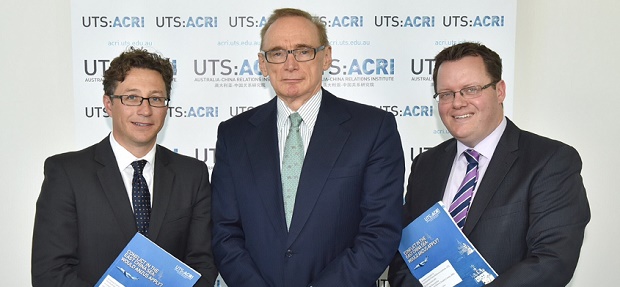Conflict in the East China Sea: Would ANZUS Apply?

A new report says that there are questions to be answered about whether Australia would be involved in a conflict in the East China Sea.
As the prime minister, Tony Abbott, concludes a week of summitry involving world leaders – including China’s president Xi Jinping, US president Barack Obama and Japan’s prime minister Shinzo Abe – a new Sydney think tank has produced an 80-page analysis suggesting the dispute between China and Japan in the East China Sea is “dangerous”, and that a war between the two could spiral into a much larger conflagration that could involve Australia.
The paper, “Conflict in the East China Sea: Would ANZUS Apply?” written by Professor Nick Bisley, editor of the AIIA’s Australian Journal of International Affairs and head of La Trobe Asia, and Dr Brendan Taylor, head of the Strategic and Defence Studies Centre at the Australia National University, provides a number of detailed future scenarios for the conflict and suggests ways for resolving it. It was commissioned by Professor Bob Carr, director of the Australia-China Relations Institute at the University of Technology, Sydney, which published it in association with La Trobe Asia and the ANU.
Bisley and Taylor devote the first 32 pages to why the East China Sea matters to Australia. “The prospects of conflict should be deeply worrying from Canberra’s perspective”, they say, pointing out that major sea lanes run through the area, with potential implications for Australia’s economic security. They argue that the East China Sea is as important as the South China Sea, through which about 60 per cent of Australian trade moves.
Beyond the economic importance of sea routes is the potential strategic impact on Australia, given that President Obama has said that the disputed Senkaku/Diaoyu islands are covered by the US-Japan security treaty. This, the authors argue, might “entangle Australia in the imbroglio”, if the ANZUS treaty were invoked by the United States.
Discussing this, they quote defence minister David Johnson, in a June interview with ABC’s Lateline, where he said he believed ANZUS would not commit Australia to a conflict where the US had sent its forces to support the Japanese in a confrontation over the islands.
While Bisley and Taylor say they think Washington has “reasonably high expectations of Australian contributions to any military contingencies in the region”, and that conflict is a “very real prospect”, they conclude that ambiguity in Article IV of the treaty “would not automatically invoke ANZUS”.“The only circumstances in which the treaty obligations would arguably come into play would be an unambiguous assault on US forces”, they conclude. That said, they still believe Australia could be caught up in the conflict, for reasons the elite and public should recognize:-
- In recent years Australia has displayed considerable enthusiasm in the strengthening of its ties with Washington, and has a “flawless record “ of being militarily involved in every instance” when asked.
- Both parties recognise the alliance has broadened to support regional peace and security.
- Australia has been developing a closer strategic relationship with Japan.
Bisley and Taylor argue for Australia to adopt sophisticated risk management, particularly “maintaining maximum freedom of policy manoeuvre”. “This means ensuring Australia does not over-commit too soon, thus taking a position in which it pays a price with Beijing unnecessarily, nor that it fails to uphold its end of alliance expectations. For Canberra, the main piece ofpolicy preparation lies in managing the expectations of the US and Japan in the event of different kinds of contingencies”.
They also argue that Australia should use its close relationship with Tokyo to get it to recognise that there is a dispute in the first place, and then to seek out ways of settling it.
Colin Chapman is immediate past president, AIIA NSW.


